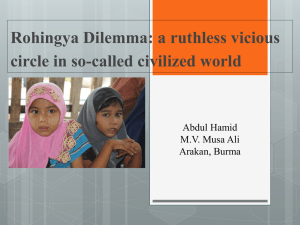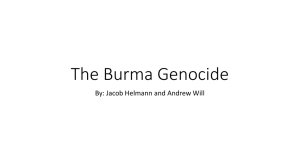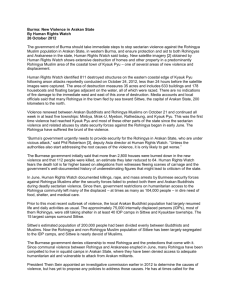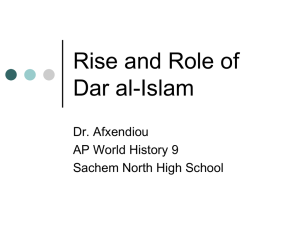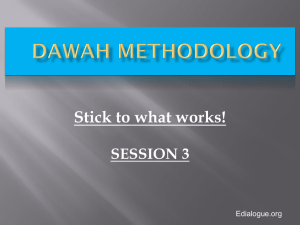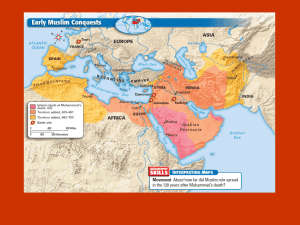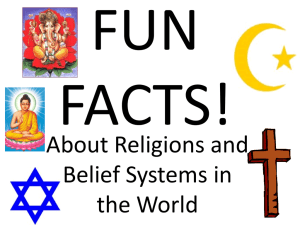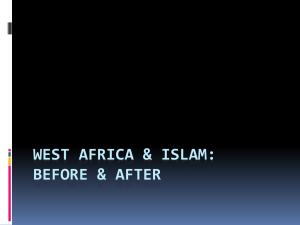The Ugly Fate of Rohingyas
advertisement
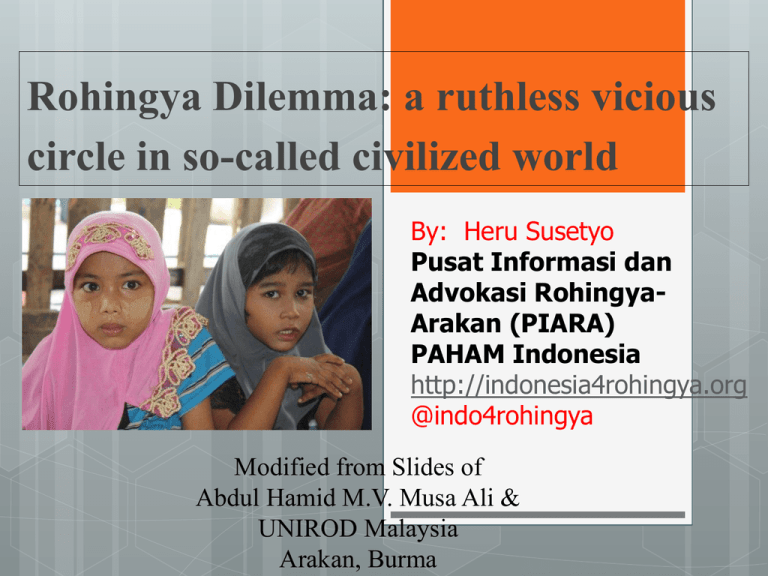
Rohingya Dilemma: a ruthless vicious circle in so-called civilized world By: Heru Susetyo Pusat Informasi dan Advokasi RohingyaArakan (PIARA) PAHAM Indonesia http://indonesia4rohingya.org @indo4rohingya Modified from Slides of Abdul Hamid M.V. Musa Ali & UNIROD Malaysia Arakan, Burma Anak-Anak Pengungsi Rohingya di Shelter Pathum Thani Bangkok Oktober 2009 Introduction Prior to Burman occupation of Arakan in 1784, Ruled by Hindus, Buddhists and Muslim Muslim Sultanate beginning in 1430 lasted for more than 350 years Until it was invaded and occupied by Burman king Bodaw Paya in 1784. The map of ancient Arakan A map showing cultural divisions of South-East Asia in 15th century A.D. as shown in the Time Atlas of World Histoiy indicating Arakan as an Islamic Stale by Geoferry Banadough P133 In the year 1824, British occupied Arakan put under India In 1937, separated form British India Arakan became a province of independent Burma in 1948. Map of present Arakan Persecution minorities Since after the 1962’s coup by general Nay Win He confiscated the properties of Indian and nationalized, later target Chinese Finally aimed at Rohingyas However, in the present regime the situation atrocities reach at its peak The problems of the Rohingyas are the result of the forcible expulsion from their homeland by means of persecution, genocidal massacres, torture and harassment in the most inhuman manner. It a is a problem of religious and political persecution systematic elimination of an ethnic Muslim community from their own homeland of Arakan Operation against Rohingyas Military Burma Operation (5th Burma Regiment) November 1948 Territorial Force (BTF) Operation 1949-50 Military Operation (2nd Emergency Chin regiment) March 1951-52 Mayu Operation October 1952-53 Mone-thone Combined Operation October 1954 Immigration and Army Operation January 1955 Union Military Police (UMP) Operation 1955-58 Captain Shwe Kyi Htin Kyaw Operation 1959 Kyi Operation October 1966 Gan Operation October-December 1966 Ngazinka Myat Operation 1967-69 Mon Operation February 1969-71 Major Aung Than Operation 1973 Sabe Operation February 1974-78 Nagamin Shwe Hintha Operation August 1978-80 Galone Pyi Operation February 1978-79 Operation 1979 Thaya Operation 1991-92 Na-Sa-Ka Operation (border security forces) (presently going on) 1992..... Na-Sa-Ka operation Headquarters is at the border town of Maungdaw to implement the following objectives:- Socio-economic deprivation of the Rohingyas; Effective control on the growth of Rohingya population; De-muslimization of Arakan through ethnic cleansing; Spread of Buddhism and Burma Buddhist culture in Arakan with prejudice on Islam and Rohingya culture. Mechanisms Extra judicial killing: Since 1989 thousands of Rohingya youths and madrasah students were killed. Arbitrary arrest and extortion: is a daily routine of business of Na-Sa-Ka and police. It is popularly known as Kalar Hmu Confiscation of properties: Land, and cattle confiscated and distribute it among Burman model villagers. Now, there are 100 model villages. Each village has 70-100 household and Each house was provided with 4 acres of land and 2 pairs of cows. Anti-Rohingya and anti-Muslim propaganda: The junta incites communal riots by allowing to distribute books and taped records insulting Islam and Muslims. Rape: Rape of women is widespread. It was an official strategy to terrorize and compel the Rohingya community to flee. Forced labor: Although forced labor is prevalent throughout Burma, in North Arakan, it is only imposed on the Rohingyas. Restriction on movements: Rohingyas are not allowed to travel freely from one place to another, even within the same locality. Restriction on marriage: take years to obtain permission, requires payment of bribes. Some brides are forced to undergo a pregnancy test. Unauthorized marriages are criminalized and are sentenced with 4 to 7 years. Restriction on employment: As non-citizens, we are barred from all kind of employment and therefore people are jobless. Restriction on education: Illiteracy is at 80%. Primary and secondary education is neglected. Due to restrictions of movement, we are prevented from attending higher education. Resttriction on religious practices Many mosques have been destroyed and closed down. No permission is given even to renovate Masjids and madrasahs while building new one is totally forbidden. It means within more and less than twenty years there will not be seen any Islamic symbolical housings Most of them are build of woods and bamboos. Contrary to it there is no hill-top left that there is no pagoda on it. 100 The new Buddhist settlement demography of Arakan change into Buddhism appearance Discrimination out of Burma A. Bangladesh Refugees are treated as sub-human being Donations are not reach to Destroyed their huts Rape refugee woman No education for children No water Unregistered camps, Kutupalong, One view of refugee camp before destroyed Another view side of refugee camp before destroyed At raining season, the view of refugee camp These huts were destroyed On 15/06/2009 Join oppression by Police Ansar Forest department View of camp area after destroyed Destroyed area from south-west side Destroyed area from south-west side Women build their hut as no man in the family Dangerous journey Due to endless persecution in Burma Unwelcoming attitudes of neighboring Bangladesh Prompted many Rohingyas to seek refuge elsewhere. In the past, Rohingyas used Saudi Arabia, UAE but as Bangladesh not issue passport; almost impossible, The only option since 2006 became a risky boat trip to reach Malaysia via Thailand. B. In Thailand In December 2008 and January 2009, as more and more Rohingyas fled on boats and reached Thai waters, Thailand changed policies and the Thai military, after torturing them on a deserted island, Towed them back to high seas with little food and water on boats with no engines. 850 were rescued in India and Indonesia but hundreds perished in the ocean. Survivors are now detained in Thailand, India and Indonesia and their fate remains uncertain. Asian summit, Thailand Failed address the problems Non-interference policies make Asian nation to shy away from the matter Surprisingly, they were branded illegal immigrant caught in Andaman sea Level as Bangli and accept them if they can porbe Burmese Bangali Why Bangali Why not Rohingya? Think! C. How about Malaysia? Caught and deported Employment No education for children Even No problems not admit into the religious school medical facilities Our humble Appeal International NGOs bodies UN, EU, OIC, ASEAN, Countries such as UK, USA, India, China, Australia and To explore a permanent solution to the outstanding Rohingya problems Within the frame work of the international law, pacts on human rights and other international practices. To pressurise the Burmese Junta: 1. To recognise Rohingyas as an indigenous ethnic 2. To issue immediately national identity cards 3. To give permission to build Mosques and other--- 4. To admit into higher education including----- 5. To stop extra- Judicial Killing, raping Rohingya women, any form of harassing 6. To stop arbitrary arrest, torture, arbitrary taxation 7. To lift ALL form of restrictions 8. To stop forced slave labour 9. To lift restrictions of Marriage 10. To stop forced Eviction and House Destruction 11. To give back forced confiscated land to their owner. 12. To call back all model villagers to their original places Our appeal to host countries To give temporary protection To issue document To give chance for education Permission Assess for employment for treatment Our appeal to NGOs To highlight Rohingya problems To form a working team among NGOs Work To collectively find a way To formulate a mechanism for permanent solution To approach government Acknowledgement ● Universal Justice Network ● Citizen International, Penang, Malaysia ● Islamic Human Rights Council, UK ● Honorable chairman, Dr. Muhideen Abdul Kader, Vice president, Consumer’s Associaton Penang. ● Ustaz Cikgu Mohd Azmi Abdul Hamid, President TERAS, and also Training Coordinator ● All staff members, for their hardworking Thank you TRAGEDI PEMBUNUHAN DI MYANMAR 3 JUN 2012- 10 ORANG PENDAKWAH ISLAM DIBUNUH DALAM PERJALANAN TANPA BELAS OLEH KUMPULAN PENGGANAS BUDDHA (RAKHINE). 9 JUN 2012-PEMBUNUHAN BERAMAI-RAMAI SELEPAS SOLAT JUMAAT. MASJID DAN TEMPAT TINGGAL UMAT ISLAM DIBAKAR Umat Islam rohingyatidak dibenarkan keluar dari Kampung halaman mereka untuk menyelamatkan diri. PENDUDUK ISLAM MYANMAR MELARIKAN DIRI KE KAWASAN YANG LEBIH SELAMAT KEPERLUAN RAWATAN KECEMASAN YANG TIDAK MENCUKUPI 10 JUN 2012-MANGSA MINORITI ISLAM ROHINGYA YANG DIBUNUH KEJAM 11 jun2012 Mayat Umat islam Rohingya yang dibunuh dengan kejam UMAT ISLAM ROHINGYA DIBAKAR HIDUP-HIDUP OLEH TENTERA MYANMAR Penduduk kampung rayu selamatkan mereka Suami mereka telah dibunuh tiada lagi bapa untuk kanakkanak ini Larikan diri daripada pembunuhan dengan sehelai sepinggan Ditahan dan kumpu kemudian siram minyak tanah dan membakar hidup-hidup Sangat sedih…. Sekeluarga kebuluran ditengah laut merekan tiada lagi pilihan lain melainkan Memanggil Allah Ramai-ramai sami budhah sedang memusnahkan masjid (rumah) ibadah islam Mereka tiada sunggup kesedihan dan kelaparan Askar & penduduk budhah membakar perumahan islam Kanak-2 bawa umur tiada selamat di perkampungan islam Pihak penguatkuasa bangladesh dilotak hak pelarian kecemasan di pantai shafar dep Berhijrah ke negara jiran tetapi bangladesh enggan diterima Mayat Imam-imam masjid berbaring di tepi jalan Rumah ibadah islam dimusnahkan tetapi mereka kekal bersolat diatas tanah Umat islam tiada selamat di myanmar akhirnya larikan diri kemana-mana dengan menaiki perahu Ramai kanak-kanak dibunuh dan cedera parah PEMBUNUHAN KANAK-KANAK SECARA KEJAM ANAK-ANAK GADIS DIROGOL DAN DIBUNUH HAMPIR SETIAP HARI Kanak-kanak disembelih dengan kejam oleh rakhine buddha
